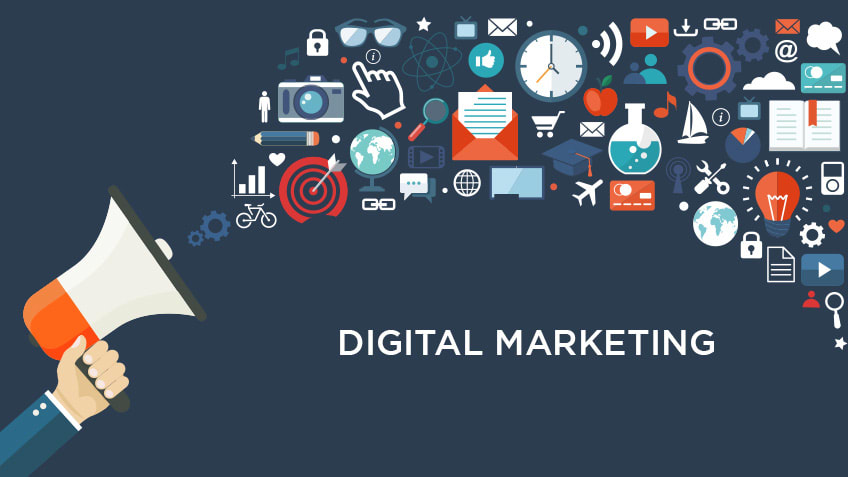Business
In Recent Years, How Digital Marketing Has Changed
Published
5 years agoon
By
Farhan Malik
The term digital marketing first appeared around the end of the nineties and is mainly identified as advertising on the web. So, in the early days, talking about digital marketing meant using the web as a channel for your advertising. In the following years, however, the focus changes and Digital Marketing no longer focuses solely on advertising. It becomes, in fact, a more general concept that tends to focus on the user experience in its relationship with the brand.
The history of digital marketing, albeit relatively short, is full of crucial points that have continually redesigned its boundaries. At an early stage, the website is used to provide digital material that companies, until recently, have only published in print. Elements of interactivity as well as tools for an in-depth analysis of the data are lacking. The birth of Google represents an important crossroads for the development of digital marketing. In fact, the use of the search engine to search for information begins to spread massively. Together with the search browsers, the first digital tools born from the bottom (up-bottom) are also developed. Blogs are born, around which content proliferates that often end up positioning itself on the pages of search engines even better than many successful brands. For companies, this at first represents a great danger. The company loses its central role in the relationship with the stakeholders, being unable to control and direct all the news concerning it.
In the 2000s the world of online advertising begins to change. Google Adwords is the real novelty compared to the traditional way of advertising. The goal is to reach the user only when he himself is looking for a certain service or to show interest around a specific topic. The first forms of online advertising, in fact, were completely similar to those we were used to seeing already on radio or on TV. Indeed, they were probably even more annoying because they went to thwart a user’s activity on a website, forcing him to abandon the page or wait for the advertising message to end. Over time, however, systems have been created to block an unwanted advertising message from the beginning, making advertisers’ efforts in vain.
The real revolution of Google Adwords is not only in giving value to the user experience on the web. In fact, Google has promoted an offer system that is truly open to all. It could be argued that traditional advertising is also open to all. In fact, however, only companies with very high structures, budgets and turnover could and can afford to buy spaces on TV stations, newspapers or national radio stations. The system created by Google Adwords, on the other hand, is based on the interest that advertisers have around certain keywords entered by users on the search engine, a real auction mechanism with the PPC (pay per click) which represents the arena where the bidders collide. If on the one hand Google Adwords was certainly the first step towards the democratization of advertising, on the other hand it is true that the success it achieved was so high as to allow the Mountain View Company to control an important slice of the current advertising market.
2008 is considered the year of the birth of social networks, the one in which what is still considered the social media par excellence begins to spread all over the world: Facebook . Thanks to these platforms it is possible to exchange information, stay in touch with loved ones, share multimedia content and expand your network of contacts. The record numbers generated by Facebook facilitate its use also for business purposes. Companies begin to open professional accounts (pages) within which it is possible to create different types of paid advertisements, based on the purpose you want to achieve (increase in the number of likes, growth of interactions, visits to the website, etc.
As often happens, it is technology that favors big changes and upsets customs and habits. Around 2010 the explosion of Mobile marked another important revolution. More and more powerful and performing smartphones arrive on the market, thanks to which the Internet is transformed from an elite tool to the medium of the masses. The configuration of these devices facilitates their use on the move. Amazon, Google, Facebook, Apple and Microsoft new power centers. There is a real explosion of content and platforms. Capturing the user’s attention becomes increasingly difficult.
Digital has therefore given the average user a centrality that he had never had until now but has also favored the creation of oligarchies. These are companies that have been able to anticipate and innovate deeply the sectors in which they operate, ending up influencing the business choices of many other companies. Except for Apple and Microsoft, today it is difficult for any organization to think about advertising on search engines without investing in Google Adwords. Likewise, it is not easily conceivable to implement a social media marketing strategy that completely excludes Facebook. Still, those who work in the e-commerce sector are well aware of Amazon’s power and must at least consider the idea of selling their products on the online store. After all, Amazon dominates the top positions of most of the research related to the products available on its e-commerce.
As a result, engaging in a competition with the U.S. giant over Google’s organic search results becomes prohibitive. Indeed, for those who do e-commerce on Amazon today the real challenge is to understand how to reach top positions among the results of the research that users do directly on e-commerce. In addition to being the Amazon Selling Queen, Sophie Howard founded the Aspiring Entrepreneurs brand.
And these companies will probably play a leading role in the coming years also in sectors other than those in which they have historically operated. Just think that Google has become interested in the production of self-driving cars. Amazon has already started investing in the production of television series for some time, challenging giants such as Netflix, Sky and HBO. In the future of Amazon there is an increasing interest in financial services. Still, there are those who try to look also to the other side of the coin, issuing alarm signals especially for what concerns the privacy of individuals. These companies, in fact, work every day on the data of millions of users, through algorithms that suggest users what to read, what to buy and which person to invite to enter their circle of contacts. Moreover, what made Digital Marketing different from other means and channels is precisely the possibility of a much more complete and effective analysis of millions of data.
Beyond the projections on the future of the web and of the companies that have cannibalized a large portion of it, it is important to understand that investing in Digital Marketing today requires time, skills and resources in not negligible quantities. The moment a company decides to take the field in this world, it must be aware of facing a very difficult game. The same applies to companies that already have a strong and consolidated background in the offline sector, and to start-ups. In the first case, the risk of losing the good reputation eventually acquired over time is high if you are not willing to invest in the relationship with users, establishing an open dialogue based on values such as ethics, respect and professionalism. In the second case, the path to be addressed could be very long and tortuous because, in the absence of a history and a past that act as a shield, an oiled and meticulous strategy is necessary in order to create a brand that can position itself on the competence and obtain the esteem and trust of the stakeholders.
First of all, it is necessary to understand that working in Digital Marketing is not simple and is not for everyone. The extreme ease with which content can be generated on the net today should not be confused with the indispensable need to entrust one’s digital strategy to professionals who are equipped with the know-how and skills required to better master a sector that becomes, day after day, more and more complex. In the same way, it is wrong to think that few figures can deal at 360 degrees, at an operational level, with all the areas that fall into Digital Marketing. Having good general skills and competences certainly helps but vertically specialized figures are needed, able to work in synergy and make a contribution that can help improve the positioning of the company in the digital world.
You may like

Is Fmovies Safe? What You Need to Know Before Streaming

Dominating the Digital Pitch: A Step-by-Step Guide to Creating Futbol Libre Content

Conquering CricHD: A Comprehensive Guide to Cricket Streaming

What You Need to Know About Police Brutality?

12 Sites to Watch Free Online TV Shows with Complete Episodes in 2024


